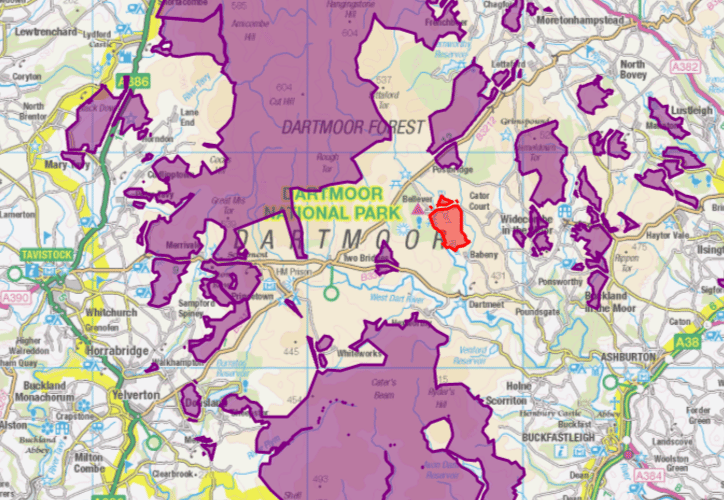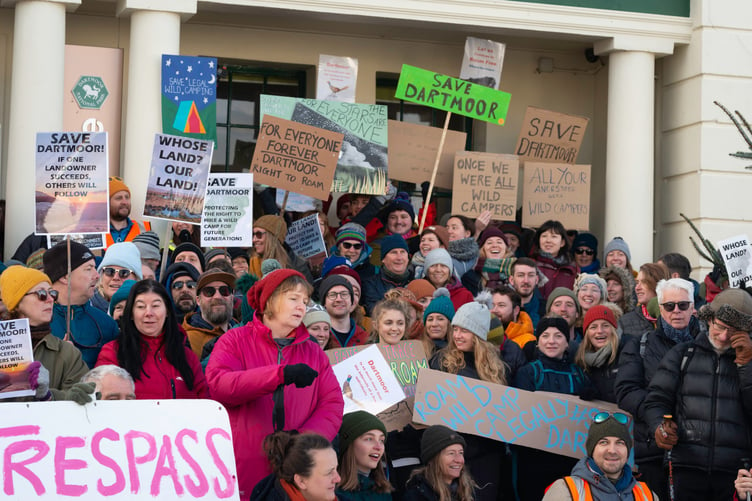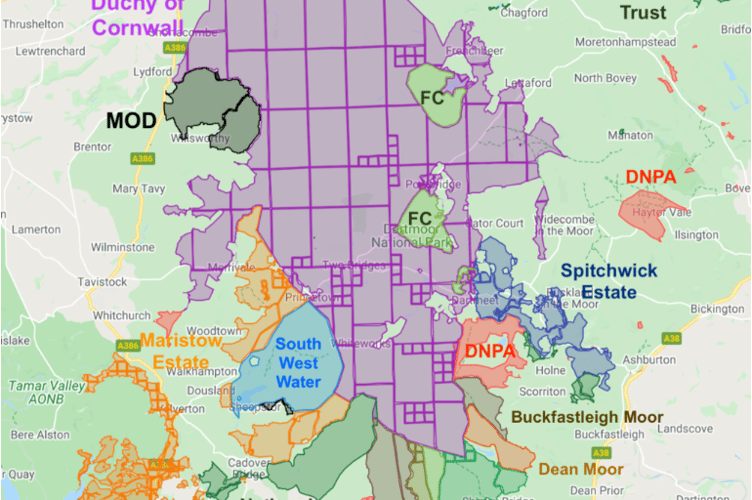A COURT case over wild camping on Dartmoor has now been adjourned, with a verdict expected to be announced in the new year. The case, brought against the park by landowner Alexander Darwall, is challenging the legal basis of Dartmoor’s bylaws that permit wild camping on the moor, despite outrage from local people, hikers and environmentalists. Among other landowners, Darwall and his wife argue that the legal basis for camping on Dartmoor never actually existed, as the 1985 act that set many of Dartmoor's bylaws never explicitly mentions camping. Critics of the move argue that the appeal will effectively end wild camping, threatening the ability of youth groups and backpackers to use the park. Catch up on the twists and turns of the case with this video and long read below.
Camping on Dartmoor
Dartmoor is the sole remaining area of England and Wales where wild camping in designated areas is legal, without any landowner’s permission. Although all land in Dartmoor National Park is in private hands, local farmers, known as commoners, have had a right to graze their livestock on the wilder, unenclosed areas of the moor for centuries. It is in these same areas that people have been wild camping for over 100 years, with bylaws enacted in 1985 legally enshrining the practice.

It is these bylaws that have enabled a range of people from diverse backgrounds to enjoy the moor, either by themselves or through organised expeditions, such as the Duke of Edinburgh treks and the famous Ten Tors Challenge. Opponents of Darwall’s appeal argue that this allows the public to experience the outdoors and responsibly connect with nature. Campaigners also argue that the right to wild camp is more crucial now than ever – citing physical and mental health benefits and its ability to spark environmental care and campaigning.
Writer, Cambridge professor and backer of the Save Our Stars campaign Robert Macfarlane, said: ‘A night under Dartmoor’s skies has been a mind-opening, life-shaping experience for tens of thousands of people down the decades. At this moment of ecological crisis, we've never needed these opportunities to connect deeply with nature more.
‘It's appalling that multi-millionaire land-owners are taking legal action to deny the public our long-established and much-beloved right to wild camp on areas of Dartmoor.’
Resistance
There was a significant public backlash to the legal challenge, with demonstrations being held in Princetown and London earlier in the month. The Princetown rally was attended by more than 100 people, coming from all over England and Wales. Speeches were given by writer and story-teller Sam Crosby, teacher Dr Nigel Coles and local business owners. After the rally, a mass hike was organised around King’s Tor. In London, scores of demonstrators gathered outside the courts, including Green Party MP Caroline Lucas.
Beca (@muddybootlaces), a teacher, Ten Tors volunteer and experienced wild camper was one of the driving forces behind the rally. Speaking on the Princetown Rally, Beca said: ’It was absolutely amazing, so many people from a broad range of backgrounds and places felt empowered to come together to raise awareness for this issue.
‘Because Dartmoor is the last place in England and Wales where you can legally wild camp, this means a lot to people. For me as a teacher, this is for the future generations. I’ve seen kids grow and develop and learn on Dartmoor. It’s so important that they continue to have that.’
Henry Briant, of Ashburton, has been hiking and wild camping on the moors for over 30 years since he first went out camping with a youth group. Coming to show his support at the demonstration, Brian said: ‘Realistically, this move will spell the end of wild camping on Dartmoor. It’s a very symbolic moment when the last place one can roam freely is taken away.
‘My experiences on Dartmoor has really shaped who I am. It’s a real shame to think that future generations may not have that opportunity to see the stars in one of the last wildernesses in England.’

+ 2
(View All)
Another organiser, Tom Sigler, is a software designer from Wiltshire. At the age of 30, Tom was diagnosed with Crohn’s disease. ‘I’d always been fairly sedentary with my desk job. But in 2009, just as I was hitting my thirties, I started feeling very unwell,’ said Tom. ‘It took being in pain for most of my thirties before I tried to turn things around.
‘I changed my thinking, worked on my diet and went to the gym, which really helped to alleviate my symptoms. But what really made it stick was hiking. It made me feel really good, so started doing it more and more, building up to increasingly challenging hikes. Wild camping became a huge part of this.
‘The outdoors is very much part of my lifestyle now, if I don’t go out enough, I start becoming unwell. If I don’t go outdoors and hike enough, I start feeling unwell. As long as I hike fairly regularly, I actually have no Crohn’s symptoms whatsoever. You could say that I need the outdoors, not just for the mental side but the physical side as well.’
Tom added: ’Many see Dartmoor as an example of how responsible camping is possible in a national park, as it’s been done for over 100 years. Dartmoor is the last bastion of wild camping, and we desperately need to protect it.’
Although the case is only being brought by one landowner, the position of the Dartmoor Commons Owners’ Association is broadly the same, and there is a concern that a domino effect could occur, as other landowners could use the judgement to end wild camping cross the moor.
Who is Alexander Darwall?
Not a great deal is known about 59-year-old Alexander Darwall, the man behind the legal challenge. Growing up on Dartmoor, Darwall is now a veteran of the financial world. He manages Devon Equity Management, a hedge fund launched in 2000, making £8 million in profit since 2020.
Darwall and his wife own two country estates, one in Scotland and one on Dartmoor. Blachford Estate is located in southern Dartmoor. The 4000-acre estate is the sixth largest on the moor, including Stall Moor and offering holidays, pheasant hunts and deer stalking.
This is not Darwall’s first run-in with national park users. Eight years ago, Darwall's decision to terminate a permissive agreement allowing people to park near the New Waste area of Dartmoor triggered a petition against the move, signed by over 500 people.
Politically, Darwall has financially supported the UK Independence Party, the Vote Leave campaign and the Conservative party several times.

What is his argument?
The Darwalls’ lawyers argue that the right of access to the moor granted by the 1985 Dartmoor Commons Act does not include wild camping. In documents obtained by the Guardian newspaper, the Darwalls assert that they ‘cannot effectively enforce their rights against members of the public’ as campers would rely on Dartmoor’s bylaws if legal action was taken by the Darwalls. They are therefore pursuing a declaration that ‘members of the public are not entitled … to pitch tents or otherwise occupy Stall Moor overnight … except with the claimant’s consent’.
The Darwalls state that he does not want to end wild camping, but instead argues that ‘the need for landowner permission to wild camp is a vital safeguard’.
Like other landowners, the Darwalls state that the increased use of Dartmoor has put excessive pressure on the park, with people lighting fires, leaving behind litter, poaching fish and causing anti-social behaviour.
The Dartmoor Commons Owners’ Association supports the claim, with a spokesperson stating: ‘The DCOA acknowledges significant problems for many of its members with fly camping and is keen to see this controlled. There are numerous campsites in the national park (but off the commons) where this can be done inexpensively with sanitation provided. However, there is extensive evidence that the commons are being used for fly camping that involves binge drinking and sometimes drugs, which would not be tolerated at campsites. Fly camping has been getting worse over the last few decades, as cheap equipment and the “festival culture” have expanded. No one should have to clear up the mess and excrement we often have to deal with.
‘We consider that the intention of landowners, the Dartmoor National Park Authority and the wild camping proponents are the same: to ensure that Dartmoor remains a pristine, unlittered and undamaged environment. Most landowners have a lifetime or multigenerational commitment to the moor, and most have a strong commitment to conservation.
‘We do not envisage circumstances whereby wild camping, including that organised such as by the Ten Tors Challenge and Duke of Edinburgh’s Award Scheme, will be affected on the majority of the Dartmoor commons as a result of the legal case by one owner for clarification of the meaning to Section 10 of the Dartmoor Commons Act 1985. Environmental restrictions will always need to be discussed and agreed upon, as they already have been for many years (such as the avoidance of key bird nesting habitats).’
‘Parts of the Dartmoor commons are currently the only places in England where camping is allowed without consent, so they attract people from many parts of the country. This seems to be one reason why fly camping has become more widespread on Dartmoor. Few visitors to Dartmoor understand the intricacies of what is common land and what is not, or look carefully at the schedule in the bylaws that lists the parts of the commons where camping is currently permitted. Since the early 2000s, social media has undoubtedly played a role in making large numbers of people aware of remote areas where they can park and camp for free.’
In court, legal representatives for Dartmoor National Park Authority argued that for decades, the law has been understood to include wild camping as part of the right to pursue recreational activities, as camping is a form of recreation.
They also assert that that is no evidence that responsible wild camping is damaging to the environment, and that newcomers should not try to overturn decades of tradition.
Tom Sigler also questioned the Darwalls' logic, arguing that banning camping would only remove law-abiding users of the park, and those that flout the rules would continue to do so. He also noted that the surge in users of the park was a result of the recent pandemic and that figures are already falling from the pandemic levels. Tom finally questioned the entire logic of the ban, arguing: ‘yes it’s a problem, but a problem of a very small number, there will always be people doing that regardless of whether it’s banned or not. If you look at something like driving. Most people drive legally, but there’ll always be people that break the rules when driving, but that doesn’t mean that you should ban cars. That’s how I see it. I think they are almost using that as an excuse for selfish intent.’




Comments
This article has no comments yet. Be the first to leave a comment.